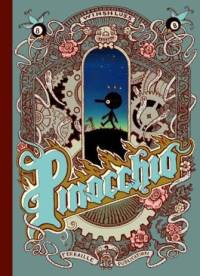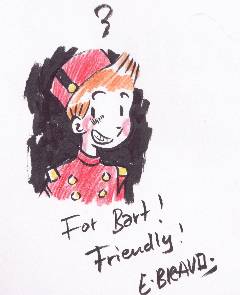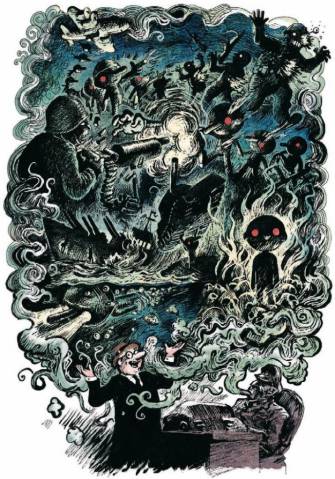 Home > Bart Beaty's Conversational Euro-Comics
Home > Bart Beaty's Conversational Euro-Comics Bart Beaty On Winshluss And The Essentials
posted March 5, 2009
Bart Beaty On Winshluss And The Essentials
posted March 5, 2009

 By Bart Beaty
By Bart Beaty

On the Friday night of this year's Angouleme Festival I sent an email to Tom from the Hotel Mercure bar, which read:
No clear consensus for book of the year yet. Maybe Winshluss' Pinocchio, which would also get most desired derivative toy.
The jury met the next morning to select the prizes. I'd hate to imply that they take their cues from this blog, but, damn, that was a good prediction on my part, wasn't it? On Sunday afternoon Pinocchio did indeed win the Fauve d'Or. No word on any award for the sculpture.
In the past I've tried to review all of the Angouleme prize winners, but in moving the award presentation until Sunday afternoon that string was snapped for me, as I (and so many others) had already left the premises long before we knew who the winners were. Nonetheless, a quick recap:
The Essentials (the five runners-up) were:
Blutch:
Le Petit Christian 2 (L'Association). I previously reviewed this book and gave it nothing but raves. It's fantastic, and a great choice. One of the best autobiographical comics of recent vintage.

Emile Bravo:
Le Journal d'un ingenue (Dupuis). I also reviewed this and loved it even more. How much did I like this book? Bravo was signing in the CIBDI bookstore on the Saturday of the Festival and I could stand in a relatively short line to get a drawing. My only problem is that I already own everything he's ever published. So I bought a second copy of this book, just to get a nice sketch and to have the opportunity to babble to him like the love-struck fanboy that I am.

Posy Simmonds:
Tamara Drewe (Denoel Graphic). My big regret this year is that I slept through the start of Simmonds' talk at the CIBDI, because I'd have loved to hear her speak. She's a genius. She may be the most underrated cartoonist on the planet today, and this book is phenomenal. Had I been on the jury, I would have held my breath until the other jurors agreed to make it the top choice, or until I turned blue and passed out.
Etienne Davodeau:
Lulu femme nue 1 (Futuropolis). This is one that hurts. I have a ton of Davodeau books and generally like them all. I picked this up and wondered if I really, really needed it. Almost bought it, but then passed. If it had won the award on Saturday, I would have bought it. Now I'll likely pick it up in Paris in June.
Blanchin and Perrissin:
Martha Jane Cannary1 (Futuropolis). This is one that I flipped through half a dozen times. I didn't meet anyone who had read it, so no one made a strong case for it, and I would have bought it if the awards had made that case. It look really nice is all I can say about it now.
The award for best work by a new talent (essentially), the Essential Revelation, went to Bastien Vives for his Le Gout du chlore (Casterman), which I also passed on. The heritage prize, Essential Patrimoine, went to Shigeru Mizuki's Operation Mort, making two awards for him, including the grand prize, in the past three years. I didn't buy this one either.

But I did pick up
Pinocchio. How could you not? I've been praising Winshluss for years as just about the funniest man in comics, and it seems that the jury agrees. Originally serialized in
Ferraille Illustre from 2003 to 2005, and interrupted for a few years while the artist co-directed a little Oscar-nominated film called
Persepolis,
Pinocchio is a scabrous modernization of the story by Carlo Collodi. Featuring bizarre sex, violent death, horribly mutated sea creatures, pathetic homeless orphans, and a slothful Jiminy Cricket, Winshluss literally stomps all over the pleasant memories of your youth here. You don't even want to know about how his seven dwarfs treat Snow White.
Winshluss comes out of a humor tradition that would be very familiar to American readers with an interest in the anarchic humor of
Mad, and the taboo-smashing of the undergrounds. His 200-page story, which is almost entirely wordless except for the occasional black-and-white Jiminy Cricket interludes (which may be the funniest segments in the book), is a rough and unpleasant read. Winshluss is unrelenting, and the tone is never optimistic, not even for a moment.

What saves the book from becoming a drag, however, are his drawing chops. Winshluss moves back and forth throughout the book between full color and black-and-white art, but also drops in occasional painted images of great depth and stunning beauty. They seem sometimes out of place with their loveliness, even when the image depicts the title character being hanged. It is the tension between the various drawing styles that I find so compelling about this book, and the dexterity with which he shifts registers is really marvelous.
Winshluss was also the subject of a major retrospective at the Festival. Visitors expecting a repeat of his breathtaking Musee Ferraille exhibition of a few years ago were initially disappointed but what appeared to be little more than a cheaply-constructed grave site scene framing some original art. The primary draw of the exhibit, however, was a full-length feature zombie film that he had directed with the money supplied by the festival, starring the likes of JC Menu and next year's Angouleme President, Blutch. Most who saw it raved about it, so maybe there's an Oscar in this man's future yet. Until that time, I'm sure the Fauve d'Or will keep him warm at night.
*****
* all images from
Pinnochio except the inset images for books from Emile Bravo and Posy Simmonds
*****
To learn more about Dr. Beaty, or to contact him,
try here.
Those interested in buying comics talked about in Bart Beaty's articles might try
here or
here.
*****
*****


